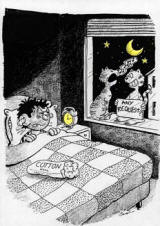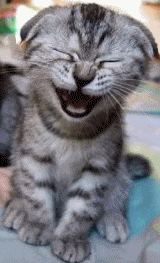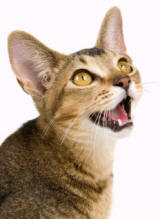|
Need Help?
|
|
Call
1-800-372-3706
to
speak to a Veterinary Behavior Technician |
|
Paws To Speak!
Member Main Menu
|
|
 |
 |
|
Help is at your
fingertips by library, email,
and phone. |
Learn more...
Vocalization


Did we say, IGNORE, unwanted behaviors?

|
How
to Turn Off the Cat Alarm
What is it?
If your cat
seems to be meowing (me-now-ing) for no apparent reason,
first consider a thorough physical exam and
medical work-up to make sure that your cat is not in any
discomfort or
medical danger. If
your cat receives a clean bill of health, then most likely your talkative
cat has learned that vocalization is one way to get your attention, food,
valet service in and out of doors, etc. Once your cat has learned
persistence pays off - even some of the time, then persistence it is!
|
Ignore
vocalization instead of
unintentionally rewarding it
with eye contact, talking,
feeding or any other type of
attention.
|
Scenario One:
your cat starts meowing. You
check the alarm clock and it's 2:00 AM. You shush your cat and go back to
bed but the meowing continues. You think maybe your cat wants food. You get
up to make sure your cat has food and water. You go back to
bed. The meowing continues --- with no end in sight!
Scenario Two: You are
tired of
your cat
waking you in the middle of the night so you put your cat
outside of the bedroom. You are awakened by
your bedroom door rattling. Could someone
be breaking into your house? You turn on the light and
see your cat's paw under the door.
Why do cats make noise
to get our attention?
If you
accidentally reward
unwanted behaviors such
as excessive
vocalization or door
banging by providing
food, attention,
or play
in an attempt to stop
the racquet, these
rewards may increase
future outbursts.
Just like the jackpots
in Las Vegas,
intermittent rewards
create persistent
behaviors.
What to do
-
To prevent night time activity, provide
sufficient daytime activities.
Add more play
and exercise during the day and
early evening.
- Give
your cat a
big meal before you go to bed to help sleeping
through the night.
- Do not
reward vocalization unless you like it and it is not a problem for you.
- Do not use physical
punishment that may increase anxiety and unwanted behaviors

Feline
Older
Adult -
7 years
and older
-
Appetite changes -
Provide food puzzle and
food toys. Do not
overfeed by providing
only food your cat likes
the best. Monitor
weight, food and water
intake. Take cat to the
veterinarian if
increased thirst, weight
gain or loss.
-
Increased Vocalization
- may occur if your
cat if feeling some
discomfort or other
stress. Take cat to the
veterinarian for a
comprehensive exam and
diagnostic testing.
-
Cat Resources -
Provide your cat lots of
comfy beds, tall
scratching posts,
horizontal cardboard
scratching areas, and
protect against weather
that is too hot or too
cold.
-
Behavior Changes are
often the first sign of
a physical problem.
Aging cats may require
special diets and
medication prescribed by
a veterinarian to
lengthen life and
quality of life.
American Association of
Feline Practitioners (AAFP)
Feline Behavior Guidelines
2004
|
"Helping you raise a fabulous feline
friend for life." |
|